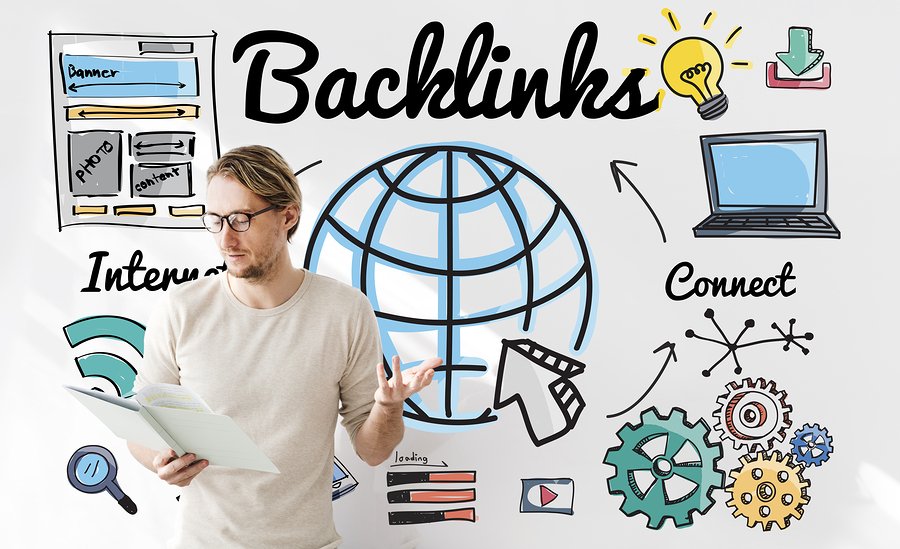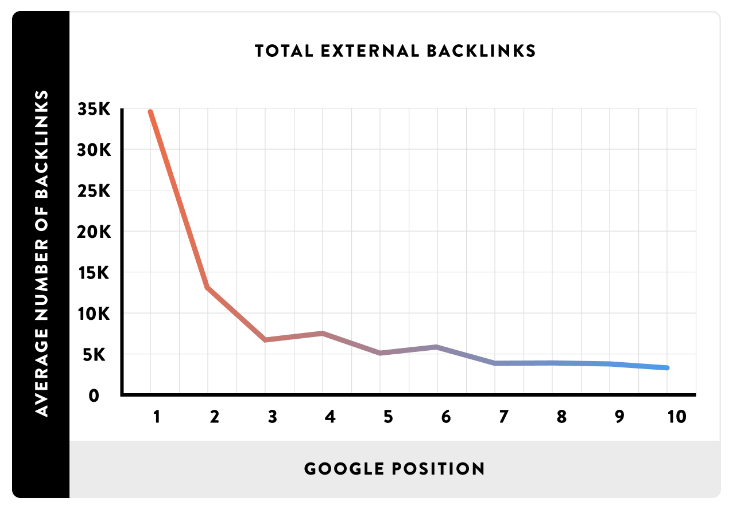Biggest Backlink Myths Revealed
Ah backlinking, the source of many people’s SEO pain. Backlinks are a fairly difficult area of SEO and it takes A LOT of work. So why do people need backlinks so much? Well, backlinks are a major part of Google’s ranking algorithm.
It is important to take the time necessary to build your backlink profile to the best it can be. This will send the signal to Google that your website is of high authority and relevance, therefore they will have no choice but to give you a better ranking.

Backlinks are a vital part of off page SEO.
Backlinks make up a major part of off page SEO. It takes significant dedication to ensure your backlinks are always quality as well as to continue to build your profile further. Backlinks are an area that requires constant work. This means you cannot simply stop and start your backlinking efforts.
This blog will go into the details about some of the biggest backlinks myths. However, if you have jumped to the end of the story and don’t actually know what backlinking is and why it is so important (or just want a refresher), have a read of the previous blog I wrote about the basics.
Because backlinking is such a difficult area to master, there are a significant number of myths that have been developed over the years. Some of these myths are so imbedded in our way of thinking that we don’t even question it and even think that the truth is wrong.
Make sure you read this blog with an open mind because there is a chance that I am going to say something completely different to what you currently believe. Of course, I don’t assume you are just going to take my word for it.
This is why I have done my research (also went to university and became qualified). As well as this, some of the myths are what a few of my own clients believe.
The list below is highly researched with other marketers as well as my own experience when talking with clients.
Make sure you have a good read of the below myths. If you find you have fallen into the trap of believing these myths make sure you change your thinking and backlinking methods quick smart. Your beliefs about how to backlink could be the reason you aren’t seeing the results you want and could actually be doing untold damage to your SEO.
Let’s get this backlinking myth busting party started!
1. It doesn’t matter how many backlinks you have.

Is backlinking about quality or quantity?
I find that a lot of people believe this if they simply have a small number of quality backlinks. I mean there is that old saying “quality over quality” right? However, it isn’t as simple as that. With backlinks you need quality AND quantity. Are you starting to realise why backlinking is so much effort?
It is important that you have relevant quality backlinks, and a lot of them. Obviously, if you are doing SEO yourself, you are not going to have a lot of time on your hands and you are probably going to have to make a compromise at some point.
If you must make a compromise, it is better to have quality backlinks. But remember that if you have a very small amount of quality backlinks this will probably do just as little as having a large amount of poor backlinks.
Recently, there has been a slight shift towards a higher weighting for the quantity of links. There is a significant connection between the number of links a website has (not only simply the quality of the links) and the position they have on Google.
The quantity of backlinks is something you can no longer ignore (or think doesn’t matter). Even in Backlinko’s extensive Google Ranking Guide, it was found that to hold the covereted number 1 ranking, you need to have about 35,000 backlinks.
Take a look at the graph below as it will help you put backlinking into perspective:

Source: backlinko.com.
It is clear to see the significant drop between the average number of backlinks for the number 1 position in Google compared to the rest of the top 10 position rankings. Still, if you want to be on the first page of Google (like everyone), you will be looking at about 4,000 backlinks.
2. You only need high quality backlinks.
Leading on from the first point – it is not quality OR quantity, it is quality AND quantity. Your backlink profile will not be sustainable on just a dozen high quality backlinks, no matter if the Queen of England herself linked to your website (although, that would be pretty awesome!).
Yes, Google loves a quality backlinks. But your backlink profile needs to be strong, healthy and filled with links – this includes links that are thought to be high quality, all the way down to commenting on blogs and/ or forums to gain that link.

Your backlink profile needs to be strong.
The most important thing is that your backlink profile is natural. So make sure all the backlinks on your profile make sense. For example, if you are a mechanic business and you posted on a makeup forum to create a backlink, this isn’t natural at all and Google is likely to see straight through it.
As well as this, high quality backlinks are hard to come by.
This doesn’t mean you just go create dodgy backlinks yourself. There is actually a happy medium. So you can fairly quickly build up your backlink profile with solid backlinks while you wait for the really high quality links to take form.
A mistake I see a lot of my clients make is disavowing links way too often. They think that if the link isn’t 100% quality then it isn’t good enough and therefore they essentially break the connection and disown the link.
By disavowing every link you receive that isn’t top notch quality, you are actually doing yourself more harm than good. So make sure you take a look at Google’s Disavow Tool to ensure you aren’t letting go of some okay backlinks.
3. Blog and/ or forum comments are bad links.

Commenting on blogs doesn’t result in a poor quality backlink.
Poor blogs and forums always getting a bad rap. This is probably because back in the day websites where spamming any blogs and/ or forums they could get their hands on. They were abusing and essentially cutting corners when it came to backlinking and Google didn’t like this.
If Google doesn’t like this, then it means you probably don’t like it as well. You should do everything you can to keep Google happy to assist your ranking. But think about what Google is actually upset about. It isn’t the action of commenting on blogs and forums itself. So you shouldn’t be afraid to do this, just make sure you are doing it right!
You can (and should) comment on any blogs and/ or forums that are actually relevant to your business. For example, a cupcake business could post on a blog that addresses the issues facing bakeries. See where I’m going with this? All it takes is common sense for you to determine whether or not a blog or forum is relevant enough to your business for you to post on.

Use common sense to work out whether another blog is relevant to your business.
As well as this, your actual post needs to be quality and not generic in nature. You can’t just say “cool blog, check out my website” and put the link in. That is spammy and Google will get cranky (hence where the myth has come from).
Make sure your comment is engaging and insightful.
Also, if you are going to comment, make sure you actually read the blog or forum and offer your own opinion. If you add something to the blog this is the best way to showcase your own ability as well as your website. This could mean that more people actually click the link you provide and have a look around your website.
Your focus needs to be on the comment itself, not the fact that you are trying to include a backlink. People can see straight through this and could result in comments being deleted by the owner. Therefore the effort you put in to create that dodgy comment will be for nothing. It is better to build relationships through your comments rather than just sticking your link in.
4. If you build your links too quickly, you will be slapped with a penalty.
I can’t tell you how many times I have heard my clients worry about the rate of time it takes to build backlinks. A lot of people believe that fast = easy. And this is the case for most things yes, but just because you can build backlinks fast doesn’t necessarily mean they are spammy links.

The rate of which backlinks are built doesn’t really matter.
And we all know what happens if Google catches you with spammy backlinks, you get a penalty.
Yes you can take the ‘slow and steady wins the race’ approach. But don’t be scared because backlinks are coming left, right and centre that you are going to be hit with a penalty. I can totally see why people think this is true, but it is very easy for me to debunk.
Let’s look at it this way, think about exactly what happens when a blog or content goes viral. People are sharing the same link (therefore creating backlinks) over and over again. If the piece is truly viral, it will also be shared by a lot of different types of businesses and people.
Do you usually see the websites that produce a constant stream of viral content get hit with a penalty? Probably not! And this works for new or small website’s as well. Google will analyse the links and realise that it isn’t spam and you won’t see a penalty.
The hardest thing you’ll have to do is create a piece of content that has enough viral potential.
If you relate this back to backlinking, when you create a high number of links quickly, so long as they are trusted by Google you will not see a penalty. You are doing your website nothing but good by having a range of links from trusted websites that have at least some sort of relevance to your business.
5. All ‘nofollow’ links are useless.
Let me explain what ‘nofollow’ links are. So when another website links to your website they have an option to choose ‘nofollow’. This means that the link is still there, but it doesn’t count towards your backlink profile.

‘Nofollow’ links actually do have some uses.
So you can see why a lot of people think that ‘nofollow’ links are worthless. Well, I am here to tell you they aren’t (surprise, surprise). Sometimes website’s don’t even realise that they have the ‘nofollow’ option on when they include links on their own website.
This means that some of the ‘nofollow’ links to your website could be by accident. If you find any ‘nofollow’ links make sure you get in touch with the owner of the website and ask them if they could change it. Even if they don’t change the situation, this is still okay because you need some ‘nofollow’ links on your profile if you want to have a sustainable ranking.
In the end, ‘nofollow’ links will still potentially give you more traffic to your website which will help boost your rankings up, just in a different method than backlinking. So make sure you don’t freak out if you see that some of your backlinks are ‘nofollow’. Also, if you are looking for a tool to help you check if you have any ‘nofollow’ links, Search Engine Genie is the tool for you!
Summary
So there you have it! The top 5 biggest backlink myths revealed. When it comes to backlinking, it is important that you have all the correct information. By believing and using incorrect strategies it can really damage your profile and mean you aren’t living up to your true potential.
When you know the whole truth, you can better develop strategies for your backlinking that will help boost your rankings and give you the edge against your competition. It is never too late to make the necessary changes to your backlink tactics to ensure success!
Did you believe in any of the above 5 myths? Let us know in the comments below! We would love to hear about how you are going to change things up.

Read ➡ How to improve SEO for your WordPress website?

We are a friendly and reliable team that pays detailed attention to your projects and management of your brand. Our team at SEO Shark has a passion for all things online. We constantly innovate using the latest professional techniques and strategies.



